LAW5730C - Conveyance: Contract Law Application and Reflections
VerifiedAdded on 2023/06/13
|6
|1545
|358
Report
AI Summary
This report provides an analysis of conveyance and contract law principles, focusing on the case of Robles V Pigg and the application of Section 126 of the Instruments Act 1958. It discusses the elements of a valid contract, including offer, acceptance, and communication, and explores the concept of specific performance as a remedy for breach of contract. The report also includes a reflection on a scenario involving undue influence in a mortgage agreement, advising on potential legal arguments under contract law. The document concludes with a list of references and is available on Desklib, a platform offering study tools and solved assignments for students.
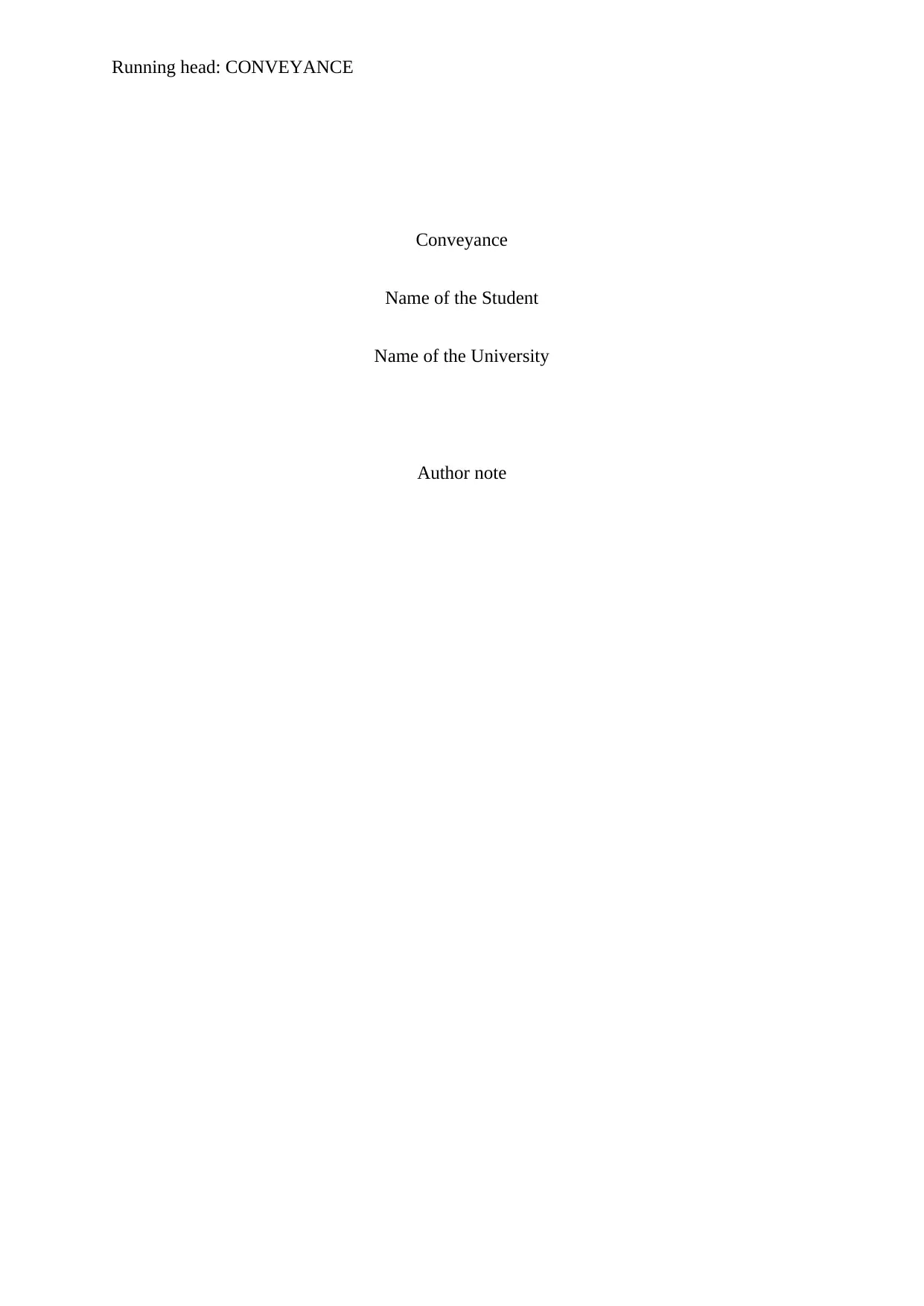
Running head: CONVEYANCE
Conveyance
Name of the Student
Name of the University
Author note
Conveyance
Name of the Student
Name of the University
Author note
Paraphrase This Document
Need a fresh take? Get an instant paraphrase of this document with our AI Paraphraser
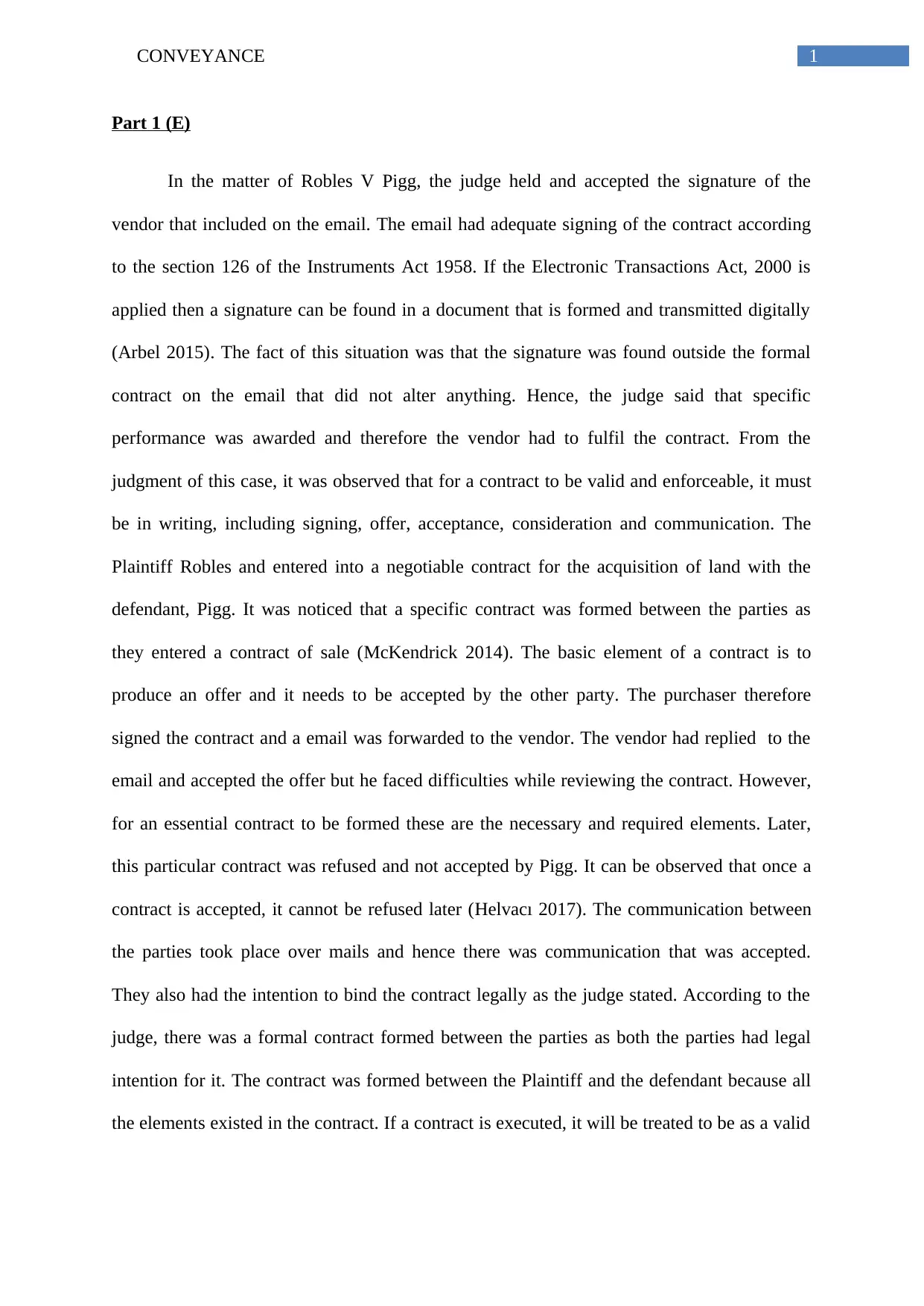
1CONVEYANCE
Part 1 (E)
In the matter of Robles V Pigg, the judge held and accepted the signature of the
vendor that included on the email. The email had adequate signing of the contract according
to the section 126 of the Instruments Act 1958. If the Electronic Transactions Act, 2000 is
applied then a signature can be found in a document that is formed and transmitted digitally
(Arbel 2015). The fact of this situation was that the signature was found outside the formal
contract on the email that did not alter anything. Hence, the judge said that specific
performance was awarded and therefore the vendor had to fulfil the contract. From the
judgment of this case, it was observed that for a contract to be valid and enforceable, it must
be in writing, including signing, offer, acceptance, consideration and communication. The
Plaintiff Robles and entered into a negotiable contract for the acquisition of land with the
defendant, Pigg. It was noticed that a specific contract was formed between the parties as
they entered a contract of sale (McKendrick 2014). The basic element of a contract is to
produce an offer and it needs to be accepted by the other party. The purchaser therefore
signed the contract and a email was forwarded to the vendor. The vendor had replied to the
email and accepted the offer but he faced difficulties while reviewing the contract. However,
for an essential contract to be formed these are the necessary and required elements. Later,
this particular contract was refused and not accepted by Pigg. It can be observed that once a
contract is accepted, it cannot be refused later (Helvacı 2017). The communication between
the parties took place over mails and hence there was communication that was accepted.
They also had the intention to bind the contract legally as the judge stated. According to the
judge, there was a formal contract formed between the parties as both the parties had legal
intention for it. The contract was formed between the Plaintiff and the defendant because all
the elements existed in the contract. If a contract is executed, it will be treated to be as a valid
Part 1 (E)
In the matter of Robles V Pigg, the judge held and accepted the signature of the
vendor that included on the email. The email had adequate signing of the contract according
to the section 126 of the Instruments Act 1958. If the Electronic Transactions Act, 2000 is
applied then a signature can be found in a document that is formed and transmitted digitally
(Arbel 2015). The fact of this situation was that the signature was found outside the formal
contract on the email that did not alter anything. Hence, the judge said that specific
performance was awarded and therefore the vendor had to fulfil the contract. From the
judgment of this case, it was observed that for a contract to be valid and enforceable, it must
be in writing, including signing, offer, acceptance, consideration and communication. The
Plaintiff Robles and entered into a negotiable contract for the acquisition of land with the
defendant, Pigg. It was noticed that a specific contract was formed between the parties as
they entered a contract of sale (McKendrick 2014). The basic element of a contract is to
produce an offer and it needs to be accepted by the other party. The purchaser therefore
signed the contract and a email was forwarded to the vendor. The vendor had replied to the
email and accepted the offer but he faced difficulties while reviewing the contract. However,
for an essential contract to be formed these are the necessary and required elements. Later,
this particular contract was refused and not accepted by Pigg. It can be observed that once a
contract is accepted, it cannot be refused later (Helvacı 2017). The communication between
the parties took place over mails and hence there was communication that was accepted.
They also had the intention to bind the contract legally as the judge stated. According to the
judge, there was a formal contract formed between the parties as both the parties had legal
intention for it. The contract was formed between the Plaintiff and the defendant because all
the elements existed in the contract. If a contract is executed, it will be treated to be as a valid
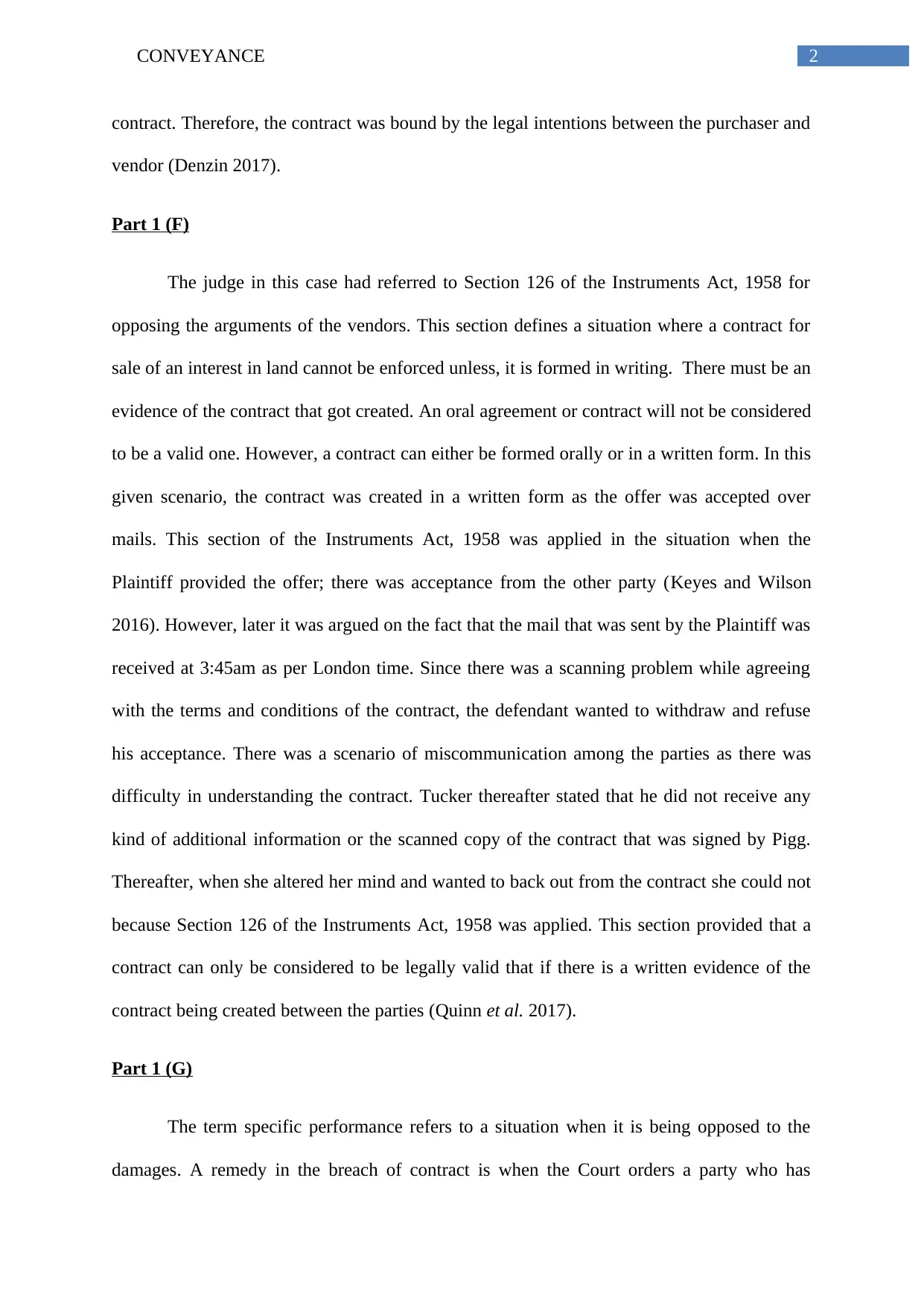
2CONVEYANCE
contract. Therefore, the contract was bound by the legal intentions between the purchaser and
vendor (Denzin 2017).
Part 1 (F)
The judge in this case had referred to Section 126 of the Instruments Act, 1958 for
opposing the arguments of the vendors. This section defines a situation where a contract for
sale of an interest in land cannot be enforced unless, it is formed in writing. There must be an
evidence of the contract that got created. An oral agreement or contract will not be considered
to be a valid one. However, a contract can either be formed orally or in a written form. In this
given scenario, the contract was created in a written form as the offer was accepted over
mails. This section of the Instruments Act, 1958 was applied in the situation when the
Plaintiff provided the offer; there was acceptance from the other party (Keyes and Wilson
2016). However, later it was argued on the fact that the mail that was sent by the Plaintiff was
received at 3:45am as per London time. Since there was a scanning problem while agreeing
with the terms and conditions of the contract, the defendant wanted to withdraw and refuse
his acceptance. There was a scenario of miscommunication among the parties as there was
difficulty in understanding the contract. Tucker thereafter stated that he did not receive any
kind of additional information or the scanned copy of the contract that was signed by Pigg.
Thereafter, when she altered her mind and wanted to back out from the contract she could not
because Section 126 of the Instruments Act, 1958 was applied. This section provided that a
contract can only be considered to be legally valid that if there is a written evidence of the
contract being created between the parties (Quinn et al. 2017).
Part 1 (G)
The term specific performance refers to a situation when it is being opposed to the
damages. A remedy in the breach of contract is when the Court orders a party who has
contract. Therefore, the contract was bound by the legal intentions between the purchaser and
vendor (Denzin 2017).
Part 1 (F)
The judge in this case had referred to Section 126 of the Instruments Act, 1958 for
opposing the arguments of the vendors. This section defines a situation where a contract for
sale of an interest in land cannot be enforced unless, it is formed in writing. There must be an
evidence of the contract that got created. An oral agreement or contract will not be considered
to be a valid one. However, a contract can either be formed orally or in a written form. In this
given scenario, the contract was created in a written form as the offer was accepted over
mails. This section of the Instruments Act, 1958 was applied in the situation when the
Plaintiff provided the offer; there was acceptance from the other party (Keyes and Wilson
2016). However, later it was argued on the fact that the mail that was sent by the Plaintiff was
received at 3:45am as per London time. Since there was a scanning problem while agreeing
with the terms and conditions of the contract, the defendant wanted to withdraw and refuse
his acceptance. There was a scenario of miscommunication among the parties as there was
difficulty in understanding the contract. Tucker thereafter stated that he did not receive any
kind of additional information or the scanned copy of the contract that was signed by Pigg.
Thereafter, when she altered her mind and wanted to back out from the contract she could not
because Section 126 of the Instruments Act, 1958 was applied. This section provided that a
contract can only be considered to be legally valid that if there is a written evidence of the
contract being created between the parties (Quinn et al. 2017).
Part 1 (G)
The term specific performance refers to a situation when it is being opposed to the
damages. A remedy in the breach of contract is when the Court orders a party who has
⊘ This is a preview!⊘
Do you want full access?
Subscribe today to unlock all pages.

Trusted by 1+ million students worldwide
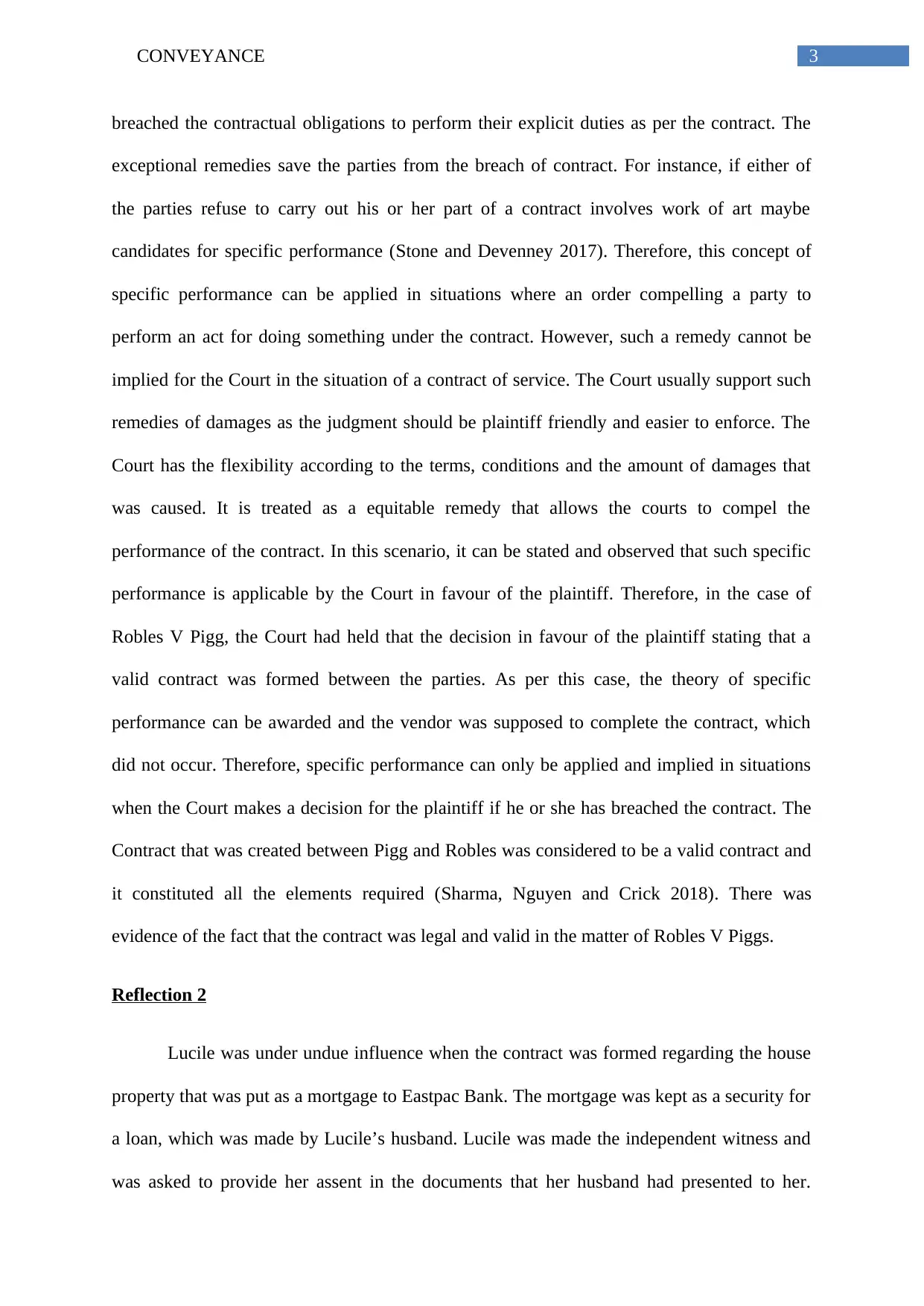
3CONVEYANCE
breached the contractual obligations to perform their explicit duties as per the contract. The
exceptional remedies save the parties from the breach of contract. For instance, if either of
the parties refuse to carry out his or her part of a contract involves work of art maybe
candidates for specific performance (Stone and Devenney 2017). Therefore, this concept of
specific performance can be applied in situations where an order compelling a party to
perform an act for doing something under the contract. However, such a remedy cannot be
implied for the Court in the situation of a contract of service. The Court usually support such
remedies of damages as the judgment should be plaintiff friendly and easier to enforce. The
Court has the flexibility according to the terms, conditions and the amount of damages that
was caused. It is treated as a equitable remedy that allows the courts to compel the
performance of the contract. In this scenario, it can be stated and observed that such specific
performance is applicable by the Court in favour of the plaintiff. Therefore, in the case of
Robles V Pigg, the Court had held that the decision in favour of the plaintiff stating that a
valid contract was formed between the parties. As per this case, the theory of specific
performance can be awarded and the vendor was supposed to complete the contract, which
did not occur. Therefore, specific performance can only be applied and implied in situations
when the Court makes a decision for the plaintiff if he or she has breached the contract. The
Contract that was created between Pigg and Robles was considered to be a valid contract and
it constituted all the elements required (Sharma, Nguyen and Crick 2018). There was
evidence of the fact that the contract was legal and valid in the matter of Robles V Piggs.
Reflection 2
Lucile was under undue influence when the contract was formed regarding the house
property that was put as a mortgage to Eastpac Bank. The mortgage was kept as a security for
a loan, which was made by Lucile’s husband. Lucile was made the independent witness and
was asked to provide her assent in the documents that her husband had presented to her.
breached the contractual obligations to perform their explicit duties as per the contract. The
exceptional remedies save the parties from the breach of contract. For instance, if either of
the parties refuse to carry out his or her part of a contract involves work of art maybe
candidates for specific performance (Stone and Devenney 2017). Therefore, this concept of
specific performance can be applied in situations where an order compelling a party to
perform an act for doing something under the contract. However, such a remedy cannot be
implied for the Court in the situation of a contract of service. The Court usually support such
remedies of damages as the judgment should be plaintiff friendly and easier to enforce. The
Court has the flexibility according to the terms, conditions and the amount of damages that
was caused. It is treated as a equitable remedy that allows the courts to compel the
performance of the contract. In this scenario, it can be stated and observed that such specific
performance is applicable by the Court in favour of the plaintiff. Therefore, in the case of
Robles V Pigg, the Court had held that the decision in favour of the plaintiff stating that a
valid contract was formed between the parties. As per this case, the theory of specific
performance can be awarded and the vendor was supposed to complete the contract, which
did not occur. Therefore, specific performance can only be applied and implied in situations
when the Court makes a decision for the plaintiff if he or she has breached the contract. The
Contract that was created between Pigg and Robles was considered to be a valid contract and
it constituted all the elements required (Sharma, Nguyen and Crick 2018). There was
evidence of the fact that the contract was legal and valid in the matter of Robles V Piggs.
Reflection 2
Lucile was under undue influence when the contract was formed regarding the house
property that was put as a mortgage to Eastpac Bank. The mortgage was kept as a security for
a loan, which was made by Lucile’s husband. Lucile was made the independent witness and
was asked to provide her assent in the documents that her husband had presented to her.
Paraphrase This Document
Need a fresh take? Get an instant paraphrase of this document with our AI Paraphraser
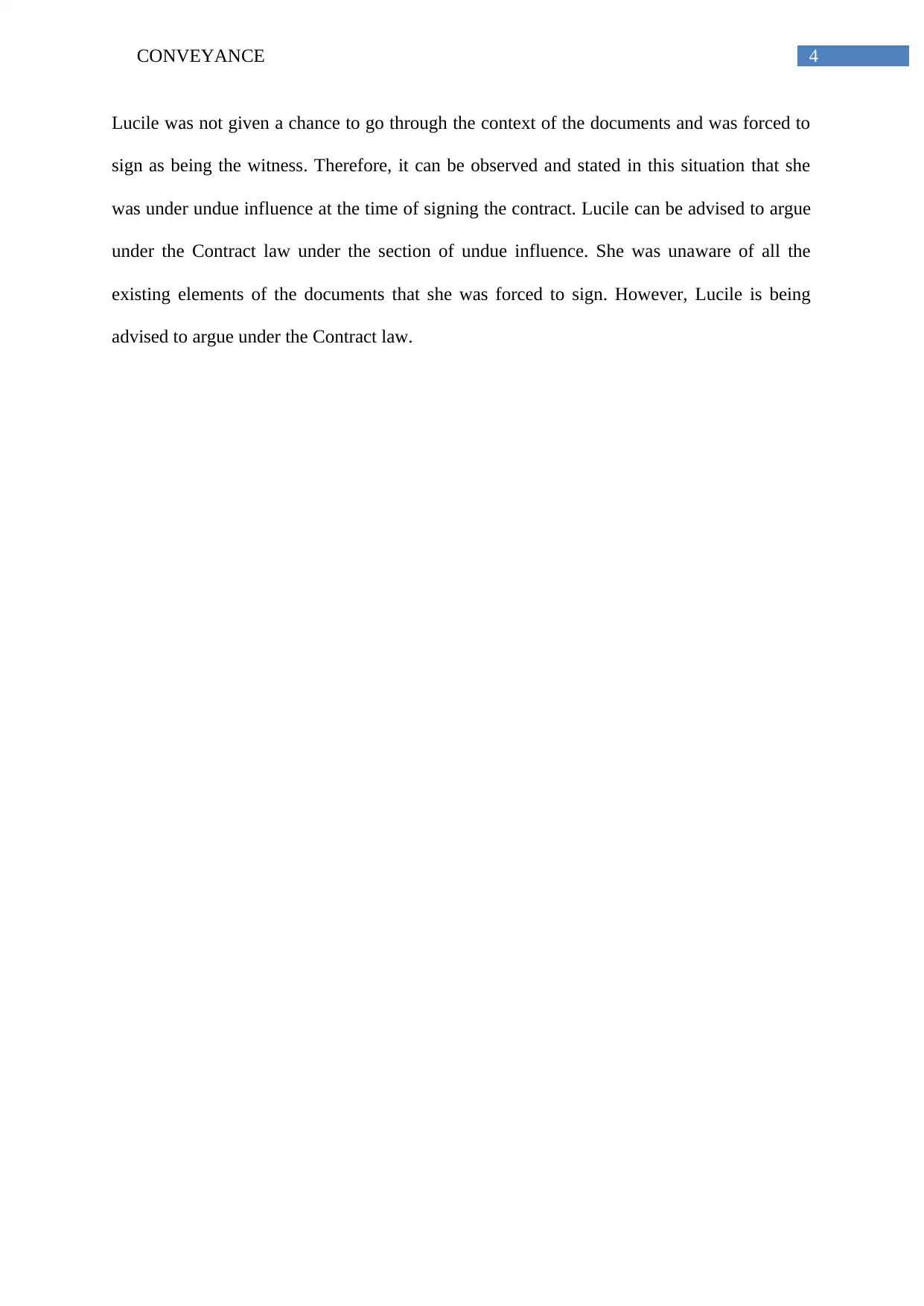
4CONVEYANCE
Lucile was not given a chance to go through the context of the documents and was forced to
sign as being the witness. Therefore, it can be observed and stated in this situation that she
was under undue influence at the time of signing the contract. Lucile can be advised to argue
under the Contract law under the section of undue influence. She was unaware of all the
existing elements of the documents that she was forced to sign. However, Lucile is being
advised to argue under the Contract law.
Lucile was not given a chance to go through the context of the documents and was forced to
sign as being the witness. Therefore, it can be observed and stated in this situation that she
was under undue influence at the time of signing the contract. Lucile can be advised to argue
under the Contract law under the section of undue influence. She was unaware of all the
existing elements of the documents that she was forced to sign. However, Lucile is being
advised to argue under the Contract law.
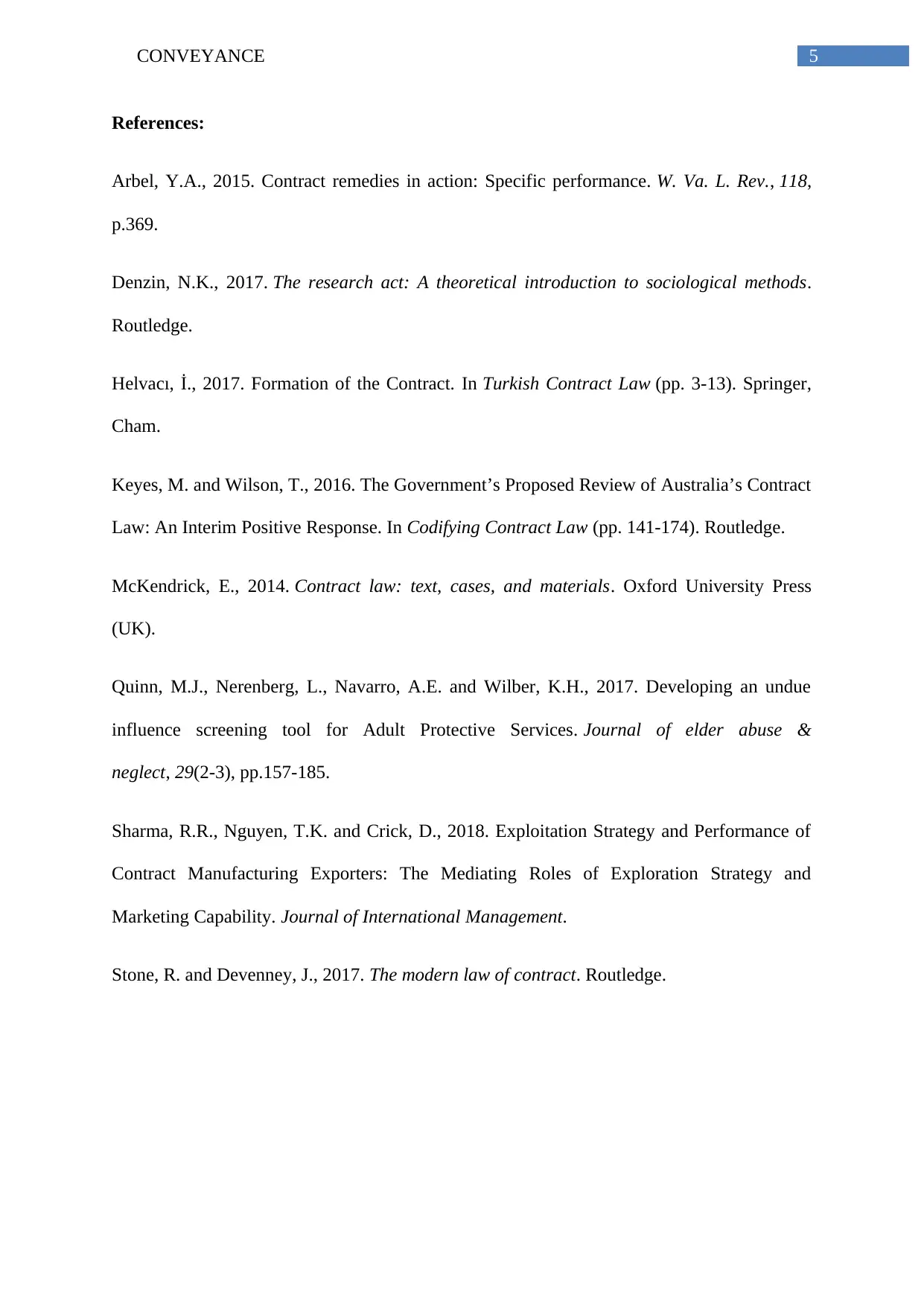
5CONVEYANCE
References:
Arbel, Y.A., 2015. Contract remedies in action: Specific performance. W. Va. L. Rev., 118,
p.369.
Denzin, N.K., 2017. The research act: A theoretical introduction to sociological methods.
Routledge.
Helvacı, İ., 2017. Formation of the Contract. In Turkish Contract Law (pp. 3-13). Springer,
Cham.
Keyes, M. and Wilson, T., 2016. The Government’s Proposed Review of Australia’s Contract
Law: An Interim Positive Response. In Codifying Contract Law (pp. 141-174). Routledge.
McKendrick, E., 2014. Contract law: text, cases, and materials. Oxford University Press
(UK).
Quinn, M.J., Nerenberg, L., Navarro, A.E. and Wilber, K.H., 2017. Developing an undue
influence screening tool for Adult Protective Services. Journal of elder abuse &
neglect, 29(2-3), pp.157-185.
Sharma, R.R., Nguyen, T.K. and Crick, D., 2018. Exploitation Strategy and Performance of
Contract Manufacturing Exporters: The Mediating Roles of Exploration Strategy and
Marketing Capability. Journal of International Management.
Stone, R. and Devenney, J., 2017. The modern law of contract. Routledge.
References:
Arbel, Y.A., 2015. Contract remedies in action: Specific performance. W. Va. L. Rev., 118,
p.369.
Denzin, N.K., 2017. The research act: A theoretical introduction to sociological methods.
Routledge.
Helvacı, İ., 2017. Formation of the Contract. In Turkish Contract Law (pp. 3-13). Springer,
Cham.
Keyes, M. and Wilson, T., 2016. The Government’s Proposed Review of Australia’s Contract
Law: An Interim Positive Response. In Codifying Contract Law (pp. 141-174). Routledge.
McKendrick, E., 2014. Contract law: text, cases, and materials. Oxford University Press
(UK).
Quinn, M.J., Nerenberg, L., Navarro, A.E. and Wilber, K.H., 2017. Developing an undue
influence screening tool for Adult Protective Services. Journal of elder abuse &
neglect, 29(2-3), pp.157-185.
Sharma, R.R., Nguyen, T.K. and Crick, D., 2018. Exploitation Strategy and Performance of
Contract Manufacturing Exporters: The Mediating Roles of Exploration Strategy and
Marketing Capability. Journal of International Management.
Stone, R. and Devenney, J., 2017. The modern law of contract. Routledge.
⊘ This is a preview!⊘
Do you want full access?
Subscribe today to unlock all pages.

Trusted by 1+ million students worldwide
1 out of 6
Related Documents
Your All-in-One AI-Powered Toolkit for Academic Success.
+13062052269
info@desklib.com
Available 24*7 on WhatsApp / Email
![[object Object]](/_next/static/media/star-bottom.7253800d.svg)
Unlock your academic potential
Copyright © 2020–2026 A2Z Services. All Rights Reserved. Developed and managed by ZUCOL.





